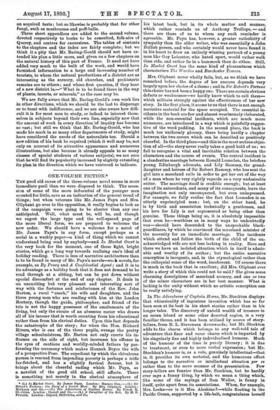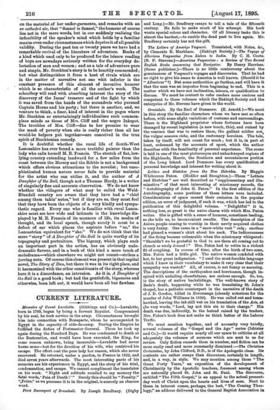ONE-VOLUME FICTION.* THE good old cause of the three-volume novel
seems in more immediate peril than we were disposed to think. The seces- sion of some of the more influential of the younger men counted for little, save as an indication of the general trend of things ; but when veterans like Mr. James Payn and Mrs. Oliphant go over to the opposition, it really begins to look as if the campaign were going to be shorter than any one anticipated. Well, what must be, will be, and though we regret the large type and the well-spaced page of the more liberal form, we are prepared to welcome the new order. We should have a welcome for a novel of Mr. James Payn's in any form, except perhaps as a serial in a weekly paper—a kind of thing which we cannot understand being read by anybody—and In Market Overt is the very book for the moment, one of those light, bright stories, which go a long way towards realising one's ideal of holiday reading. There is less of narrative architecture than is to be found in many of Mr. Payn's novels—such novels, for example, as By Proxy and A Confidential Agent ; and it is to its advantage as a holiday book that it does not demand to be read through at a sitting, but can be put down without special discomfort at the end of any chapter. It deals in an unexciting but very pleasant and interesting sort of way with the fortunes and misfortunes of the Rev. John Barton, a rural " coach," his wife and daughters, and the three young men who are reading with him at the Leadon Rectory, though the guide, philosopher, and friend of the trio is not the happy possessor of the emoluments of the living, but only the curate of an absentee rector who draws all of his income that is worth counting from his educational rather than from his clerical duties. Upon this fact depends the catastrophe of the story ; for when the Hon. Richard Rivers, who is one of the three pupils, wrongs the pretty village schoolmistress, Mr. Barton not only exerts his in- fluence on the side of right, but increases his offence in the eyes of cautious and worldly-minded fathers by per- forming the ceremony which makes Hannah Bryce the wife of a prospective Peer. The expedient by which the chivalrous parson is rescued from impending poverty is perhaps a trifle far-fetched, and has a slightly farcical flavour, but it brings about the cheerful ending which Mr. Payn, as a novelist of the good old school, still affects. There is something not merely in the clerical atmosphere of
• (1.) In Market Overt. By Jamas Payn. London: Horace Cox.—(2.) Sir Robert's Fortune: the Story of a Scotch Moor. By Mrs. Oliphant. London : Methuen and Co.—(3.) The A4,entures of Captain Horne. By Frank R. St..ckton. London : Cassell and Co.—(4.) A Daughter of the Soil. By M. E. Francis. London: Osgood, McIlvaine, and Co.
his latest book, but in its whole matter and manner, which rather reminds us of Anthony Trollope, — and there are those of us to whom any such reminder is agreeable. Mr. Payn has, however, a greater catholicity of sympathy than the older writer, who was essentially a John Bullish person, and who certainly would never have found it in his heart to draw an entirely winning portrait of a young man like Guy Leicester, who hated sport, would rather walk than ride, and rather lie in a hammock than do either. Still, In Market Overt has the same kind of pleasantness which characterises The Warden and Barchester Towers.
Mrs. Oliphant never wholly fails, but, as we think we have remarked before, the degree of her success depends very largely upon her choice of a theme ; and in Sir Robert's Fortune this choice has not been a happy one. There are certain obvious defects or weaknesses—we hardly know which to call them— which militate strongly against the effectiveness of her new story. In the first place, it seems tons that there is not enough narrative material for the space occupied. The essential in- cidents in the book are few and almost wearisomely elaborated, while the non-essential incidents, which are much more numerous, are introduced in a way which is painfully sugges- tive of the word padding. In the second place, the book is much too uniformly gloomy, there being hardly a chapter between the two covers which can be described as positively cheerful. In the third place—and this is the most serious objec. tion of all—the story never really takes a good hold of us ; we fail to recognise a vital and inevitable relation between the characters and the course of events. The central incident is clandestine marriage between Ronald Lnmsden, the briefless young Edinburgh advocate, and Lily Ramsay, the grand- daughter and heiress of Sir Robert Ramsay, who has sent the girl into a moorland exile in order to get her out of the way of a man whom he very rightly regards as a very undesirable suitor. The marriage itself is credible enough ; but at least one of its antecedents, and many of its consequents, leave the imagination not only unconquered, but even unimpressed. For example, we fully realise the fact that Lumsden is an utterly unprincipled man ; but on the other hand, he is by birth and association technically a gentleman, and his love for Lily is not represented as being other than genuine. These things being so, it is absolutely impossible that even he—worthless as in many ways he undoubtedly was—should have descended to the unspeakable black- guardliness, by which he convinced the moorland minister of the necessity for an immediate marriage. The incidents which attend and follow the birth of the child of the un- acknowledged wife are not less lacking in reality. Here and there we have an isolated situation which in itself is admir- able and worthy of its author ; but the entire narrative conception is inorganic, and, in the etymological rather than the colloquial sense of the word, incoherent. Of course there is much in the book that is excellent; did Mrs. Oliphant ever write a story of which this could not be said P She gives some charming descriptions of moorland scenery, and one or two of the minor characters are in her best manner. What is lacking is the unity without which no artistic conception can be really satisfying.
In The Adventures of Captain Horne, Mr. Stockton displays that whimsicality of ingenious invention which has so far been seen at its best in his short stories rather than in his longer tales. The discovery of untold wealth of treasure in an ocean island or some other deserted region, is a very familiar theme, and it has been utilised by scores of story- tellers, from R. L. Stevenson downwards ; but Mr. Stockton adds to the charm which belongs to any well-told tale of adventure that finer and rarer charm which is imparted by his singularly fine and highly individualised humour. Much of the humour of the time is purely literary ; it is due to treatment, or even to mere verbal expression; but Mr. Stockton's humour is, as a rule, genuinely intellectual—that is, it provides its own material, and the humorous effect belongs to the narrative or intellectual situation per se rather than to the mere manner of its presentation. Few story-tellers are funnier than Mr. Stockton, but he hardly ever says a funny thing, by which we mean a thing which, like some of the sayings of Sam Weller, is fanny in itself, quite apart from its associations. When, for example, Mrs. Leeks—or is it Airs. Aleshine ?—while floating in the Pacific Ocean, supported by a life-belt, congratulates herself on the material of her under-garments, and remarks with an ex cathedrci air, that " flannel is flannel," the humour of course lies not in the mere words, but in our suddenly realising the
inflexibility of the speaker's mind which holds by a familiar maxim even under circumstances which deprive it of all possible validity. Daring the past ten or twenty years we have had a remarkable revival of the literature of adventure. Books of a kind which used only to be produced for the leisure reading of boys are nowadays seriously written for the everyday de- lectation of men and women ; and as a tale of adventure pure and simple, Mr. Stockton's story is to be heartily commended ; but what distinguishes it from a host of rivals which are in the matter of narrative not one whit inferior is the constant presence of this element of inventive humour which is so characteristic of all the author's work. The schoolboy will read with absorbing interest the story of the discovery of the Incas' treasure and of the fight by which it was saved from the bands of the scoundrels who pursued Captain Horne and his party ; but there is another, and, we venture to think, a finer, kind of interest in the pages where Mr. Stockton so entertainingly individualises such common- place minds as those of Mrs. Cliff and the negro Inkspot. The troubles of Mrs. Cliff—due to her promise to wear the mask of poverty when she is really richer than all her would-be helpers put together—are conceived in the true spirit of Stocktonian comedy.
It is doubtful whether the rural life of South-West Lancashire has ever found a more truthful painter than the lady who calls herself M. E. Francis. The stretch of fiat, low- lying country extending landward for a few miles from the coast between the Mersey and the Ribble is not a background which offers obvious attractions to the novelist ; but unso- phisticated human nature never fails to provide material for the artist who can utilise it, and the author of A Daughter of the Soil, though not a Thomas Hardy, is a writer of singularly fine and accurate observation. We do not know whether the villagers of what may be called the Weld- Blundell country are aware that they have had a " chid amang them takin' notes," but if they are so, they must feel that they have been the objects of a very kindly and sympa- thetic regard. Every one who is familiar with rural Lanca- shire must see how wide and intimate is the knowledge dis- played by M. E. Francis of its manners of life, its modes of thought, and its local speech, though surely it must be a defect of ear which places the aspirate before " oo," the Lancastrian equivalent for "she." We do not think that the mere " story" of A Daughter of the Soil is quite worthy of its topography and portraiture. The bigamy, which plays such an important part in the action, has an obviously melo- dramatic flavour, and in a book of this kind a mere touch of melodrama—which elsewhere we might not resent—strikes a jarring note. Of course this element was present in that capital novel, The Story of Dan, but there it was in its right place, and it harmonised with the other constituents of the story, whereas here it is a discordance, an intrusion. As it is, A Daughter of the Soil is a good book; but had the gentlefolk, bigamous and otherwise, been left out, it would have been all but flawless.



































 Previous page
Previous page